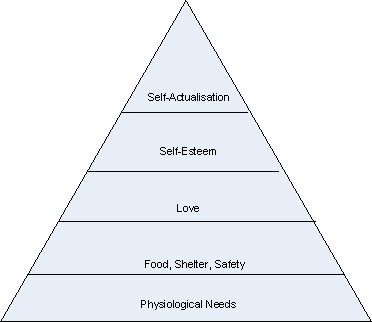Maslow is often-quoted still today, having developed a seminal theory of the needs of human beings. Herzberg's and McGregor's neo-human relations theories both focus on motivation and leadership, but their theories are, as we shall see, very different.
In this group we find a particular focus on human motivation including:
In this group we find a particular focus on human motivation including:
- satisfaction
- incentive
- intrinsic
- This psychologist, from his studies, proposed a hierarchy of human needs building from basic needs at the base to higher needs at the top.

- Maslow made assumptions that people need to satisfy each level of need, before elevating their needs to the next higher level e.g. a hungry person's need is dominated by a need to eat (i.e survival), but not to be loved, until he/she is no longer hungry.
- Today the focus in most Western societies is on the elements towards the top of Maslow's hierarchy - in which work environments and 'jobs' (including 'having a job' and the satisfaction or otherwise such jobs provide - have become typical features. Notably the attainment of self-esteem and, at the very top of the hierarchy, what Maslow calls 'self-actualisation' - fundamentally the synthesis of 'worth', 'contribution' and perceived 'value' of the individual in society.
Advantages
- Managers can/should consider the needs and aspirations of individual subordinates.
Disadvantages
- The broad assumptions in 2 above have been disproved by exceptions e.g. hungry, ill artist working in a garret.
- Empirical research over the years has not tended to support this theoretical model.
Regarding monetary reward, sometimes beyond certain level of pays (e.g. consultant) other things become more important than another £1000 a year
e.g. working conditions, boss, environment etc.
e.g. working conditions, boss, environment etc.
No comments:
Post a Comment